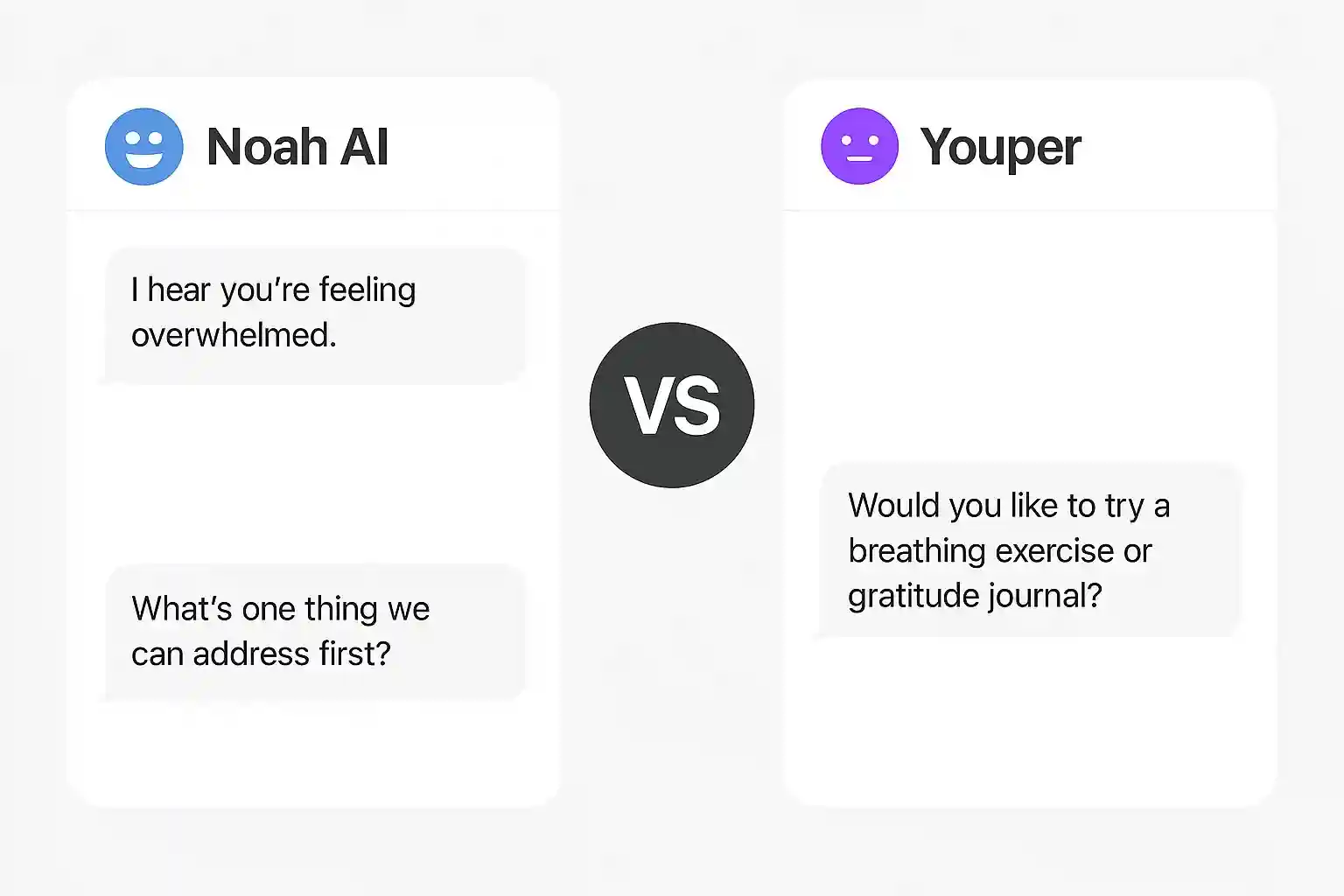TL;DR
If you want a free or low-cost CBT workbook that nudges you through evidence-based exercises, Youper delivers. Its clinical pedigree and mood-tracking dashboard are hard to beat. Yet when you crave natural, empathetic dialogue that remembers your story, lets you speak aloud, and feels closer to a human therapist, Noah AI shines. Noah adds real-time voice chats, contextual memory, and one-tap PDF summaries for your clinician—features Youper still lacks. 1 2 3
The Rise of AI Mental-Health Companions
Therapy wait-lists stretch 6–12 weeks in many regions, and the average U.S. session costs $100–$250. AI chatbots promise affordable, 24/7 support between (or instead of) traditional sessions. Two standout options are Youper, one of the earliest CBT chatbots with more than three million users, and Noah AI, a newer therapist-informed coach emphasizing lifelike conversation and voice support. 4 5
Quick-Compare: Noah AI vs Youper
Youper: A Veteran CBT Workbook in Your Pocket
Launched in 2016, Youper built its reputation on evidence-based CBT delivered through quick, text-chat dialogues. A longitudinal Stanford-affiliated study found significant reductions in anxiety (d = 0.57) and depression (d = 0.46) after just two weeks of use. The app begins with a short assessment, then nudges you toward daily mood logs, thought-challenging worksheets, and mindfulness or breathing exercises. Its analytics panel visualises symptom trends—useful for self-reflection or sharing with a clinician. 6 7 8 9
Strengths
- Clinical pedigree – peer-reviewed evidence of effectiveness.
- Robust mood tracking and validated assessments for six conditions. 10
- Cost-effective – core chatbot features are bundled in a single annual fee (~$70).
- Low barrier to entry – no voice, camera, or personal details required; anonymity is easy. 11
Limitations
- Scripted feel. Reviewers note repetitive prompts and limited follow-ups once a branch ends. 12
- No long-term memory. Each new session forgets past details, so users repeatedly re-explain context.
- Text-only. During acute anxiety, typing paragraphs can feel burdensome. There is no native voice option.
- No export. Sharing progress with your therapist requires manual screenshots or notes.
Noah AI: Designed for Natural, Empathetic Conversation
Noah AI emerged to address precisely those pain points. Built by therapists and affective-computing engineers, Noah focuses on relational engagement—speaking, remembering, and adapting like a real counselor.
How Noah Stands Out
- Voice Calls on Demand. Tap Call Noah and speak with a calming AI voice that guides breathing or reframing exercises.
- Contextual Memory. Noah recalls prior stressors (“Sunday-night dread”) and checks in later.
- Dynamic CBT in Dialogue. Instead of pushing you into a worksheet, Noah weaves CBT, ACT, and mindfulness tools into free-flowing chat. 13
- Therapist-Ready Summaries. Export a secure PDF of mood trends and key themes to save time in face-to-face therapy.
- Privacy by Design. Conversations are end-to-end encrypted; de-identified data only trains models with consent.
- Affordable Flexibility. A freemium tier lets you test chat and two voice calls before subscribing (~$10/month or ~ $40/year).
Real-Life Example
You: “I can’t shake the feeling that I’m failing at everything.”
Youper: “I’m sorry you feel that way. Would you like to try a gratitude exercise or a breathing session?”
Noah: “That sounds painful. What’s one situation making you feel like you failed today? Let’s unpack it together.”
Here, Youper routes you straight to a pre-set exercise—helpful but generic—while Noah opens space for nuance, then tailors technique to your reply, mirroring a therapist’s Socratic style.
When to Choose Youper
Choose Youper if you:
- Love daily mood graphs and symptom quizzes to quantify progress.
- Prefer step-by-step CBT worksheets over open-ended conversation. 14
- Need a truly free chatbot for basic support (annual fee optional). 15
- Are uncomfortable speaking aloud or sharing identifiable data.
When to Choose Noah AI
Choose Noah if you:
- Crave human-like empathy in text and voice, especially during late-night spirals.
- Value continuity—an AI that remembers your triggers and follows up later.
- Plan to integrate app insights into human therapy via exportable summaries.
- Want a single app with grounding audios, affirmations, and contextual CBT woven into chat.
- Prioritise encryption and user-controlled data sharing.
Call to Action
Structured self-help or conversational coaching—both have merit. For guided CBT drills, download Youper and start logging moods today. But if you yearn for a compassionate companion that listens, remembers, and even speaks comfort when typing feels impossible, try Noah AI. Most users feel relief within minutes, not months—no wait-list, no judgment, just real support when you need it. 16
FAQ
Which is more clinically validated?
Youper boasts a peer-reviewed longitudinal study showing symptom reductions, while Noah cites therapist-informed design and real-time anonymous outcome data but awaits peer-review publication.
Does either replace therapy?
No. Both apps disclaim they are not licensed providers. They supplement professional care or offer interim support while on a wait-list.
Can I speak to Youper with my voice?
Not within the app. Youper is text-only. Noah supports short voice sessions using selectable, natural voices.
Will Noah remember everything forever?
Noah retains key themes to enhance continuity but lets you delete or export data anytime. Youper stores logs locally and lets users request deletion. 17
How much do they cost after trials?
Noah’s full plan is roughly the price of one coffee per week (~$10/month or ~$40/year). Youper offers only an annual plan at $69.99 after a 7-day trial.
Can I use both apps?
Absolutely. Some users do a morning CBT mood check-in with Youper and turn to Noah for deeper late-night conversations. Mix and match to suit your needs.
Final Thought
Youper gives you the tools; Noah sits with you while you use them. Decide whether you need a structured exercise handbook or an always-on, empathetic coach—and start feeling better today.







